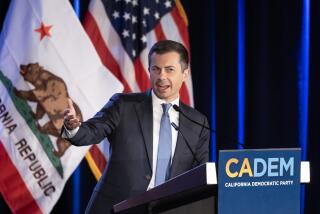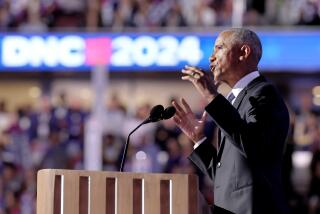Rivals Give Southern Democrats a Preview of Super Tuesday
LITTLE ROCK, Ark. — Two leading Democratic presidential contenders, appearing before a gathering of influential Southern legislators that concluded here Wednesday, provided a preview of the issues that will likely prove crucial to next March’s Super Tuesday primary.
Missouri Rep. Richard A. Gephardt charged that his rival, Massachusetts Gov. Michael S. Dukakis, views such important national matters as trade and energy “through a regional prism.” But Dukakis contended that his track record in presiding over his state’s economic boom demonstrates that he is best suited to solve the nation’s problems.
6 Others Address Meeting
Six other presidential aspirants, two of them Republicans, addressed the annual meeting of the preponderately Democratic Southern Legislative Conference, attended by about 1,000 lawmakers, many of whom helped create the March 8 primary contests in 14 Southern and border states.
But Gephardt and Dukakis commanded special attention because they are considered front runners in Iowa and New Hampshire respectively and because of their previous one-on-one debate in Iowa earlier this month.
The Super Tuesday contest, in which about 30% of Democratic national convention delegates will be chosen, looms as decisive for these two contenders. It would appear to offer Gephardt the opportunity to establish himself as the undisputed leader in the nomination race, while presenting Dukakis with a do-or-die challenge to show that he can win votes outside his own Northeast.
And, even if one or both of them falters before next March, the debate now taking shape between them would probably still greatly influence the outcome of the race, just as the early argument between Walter F. Mondale and Ohio Sen. John Glenn over Democratic Party policies shaped the subsequent contest between Mondale and Gary Hart in 1984.
Many Democratic leaders in the South remain uncommitted in hopes that Georgia Sen. Sam Nunn decides to enter the race. Nevertheless, judged by their performances here, Dukakis and Gephardt showed signs of overcoming their shortcomings.
Fervor From Gephardt
Gephardt, who has a reputation as a mechanical speaker, delivered his talk with genuine fervor and emotion. “He is getting a lot more fire in his delivery,” said Jon Mills, Speaker of the Florida House of Representatives and former co-chairman of the now defunct Hart presidential campaign.
Dukakis, who at times can seem stuffy on the stump, bragged facetiously about being named one of the 10 sexiest men in the country by Playgirl magazine. It prompted his 18-year-old daughter to laugh uncontrollably, he said.
Gephardt supporters believe their man will be aided by the contrast between his border state breeding and the urban Northeast culture that produced Dukakis.
Dukakis is going to have to deal with perceptions in the South about his Greek heritage, his Jewish wife, his nasal tones and his short stature, said Arkansas Rep. Beryl Anthony, chairman of the House Democratic Campaign Committee and a key Gephardt supporter. “The question is whether he can overcome those problems,” Anthony said.
But Dukakis, whose wife, Kitty, observes the Jewish faith while he is a Greek Orthodox, seemed to get along well enough at a breakfast session here with about 450 political activists who call themselves “The Political Animals.”
Far from being uncomfortable about his Greek background, he invited as his guest Carol Lawson, recently chosen as Miss Arkansas, who Dukakis pointed out to the group is of Greek descent.
Afterward, James (Skip) Rutherford, head of the group, said: “He’s well on his way to establishing a base of support for himself here.”
Gephardt and Dukakis did not confront each other directly, since the former spoke Tuesday while the latter appeared the next day. But in their remarks to the conference sessions and to reporters, and other appearances here, the battle lines on themes and issues were sharply drawn:
--Trade. “We need a tough trade policy that demands other countries treat us as we treat them,” declared Gephardt, defending his proposal to give the President more power to retaliate against unfair trading practices.
“The President of the United States has all the authority he needs” to deal with the problem, said Dukakis, warning that Gephardt’s approach would set off a trade war. Instead he called for economic development to make U.S. industry more competitive, including a $500-million “strategic investment fund” that would be used to encourage development projects in depressed areas.
--Defense. Recalling that Dukakis had criticized him during their recent debate for casting votes in favor of the MX missile, the B-1 bomber and other weapons, Gephardt said: “I don’t think the Democrats can win if we don’t stand for a strong defense.”
Dukakis contended that “we are spending billions of dollars on exotic weapons systems” while neglecting conventional weapons. Citing the recent shortage of mine sweepers to deal with the Persian Gulf crisis, Dukakis said he favored strong conventional weapons capability.
--Energy. “We need an oil import fee to make America energy independent,” Gephardt said, contending that the U.S. decision to reflag and escort Kuwaiti tankers showed the continued U.S. dependence on imported oil and the lack of an energy policy.
But Dukakis argued that the $5-a-barrel fee Gephardt proposes would be “a serious mistake,” because it would amount to a $50-billion tax on American consumers. It would also damage the fragile economy of Mexico, which depends on oil exports, he said.
In the end, though, it may be the points they agree on that will cost both Dukakis and Gephardt Southern support. After Gephardt expressed his opposition to the Supreme Court nomination of Judge Robert H. Bork, a position he shares with Dukakis, Alabama State Sen. Earl Goodwin shook his head sadly and brandished a large “Sam Nunn--Where Are You?” button.
And after Dukakis said he, like Gephardt, is opposed to further aid to the contras in Nicaragua, Mississippi State Rep. Charles Capps Jr. said that he was “disappointed. I think communism in Central America is a very serious threat.”
Express Reservations
The legislators seemed to like all the Democratic candidates personally, but expressed reservations about whether their stands will win votes in the South.
For example, the Rev. Jesse Jackson won two standing ovations Wednesday during a speech in which he proclaimed “a new South must arise, a South where no one is holding anyone down, where wages are not being held down . . . where leadership is not being held down. If we must fight, let it be the right fight--for jobs and peace and justice.”
Afterward, Alabama state Rep. Claud Walker told the Associated Press: “Mr. Jackson was a tremendous orator; he’s a great orator.”
But “the fact is, the message was, ‘soak the rich, increase social programs, increase taxes,’ ” Walker said. “It’s still the old Walter Mondale program and it just won’t fly.”
The other Democratic candidates who appeared at the three-day conference were Illinois Sen. Paul Simon, Tennessee Sen. Albert Gore Jr. and former Arizona Gov. Bruce Babbitt. Republican Sen. Bob Dole of Kansas and former Republican Sen. Paul Laxalt of Nevada also addressed the gathering.
More to Read
Get the L.A. Times Politics newsletter
Deeply reported insights into legislation, politics and policy from Sacramento, Washington and beyond. In your inbox three times per week.
You may occasionally receive promotional content from the Los Angeles Times.










